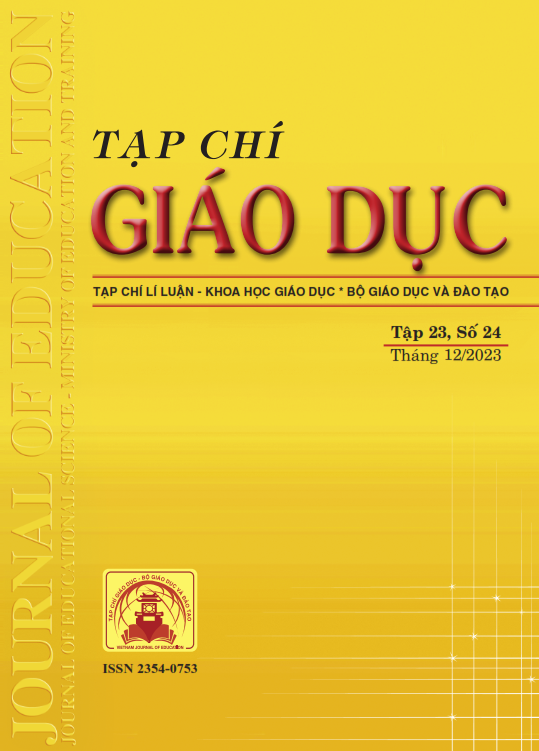Sử dụng tác phẩm văn học dân gian trong giáo dục năng lực cảm xúc - xã hội cho trẻ mầm non
Tóm tắt
Social-emotional competence education has been widely researched in many countries around the world and has received growing attention in Vietnam, especially in recent years. Social-emotional competence education for preschool children is considered the foundation, playing an important role in the process of enhancing children's confidence and developing their communication and social interaction competencies. This article analyzes the advantages of folk literature in developing social-emotional competencies, outlines principles and proposes measures to use folk literature in educating social-emotional competence for preschool children. The results of this research help preschool teachers effectively use folk literature in developing children's social-emotional competence in preschools.
Tài liệu tham khảo
Bộ GD-ĐT (2021). Chương trình giáo dục mầm non (ban hành kèm Thông tư số 01/VBHN-BGDĐT ngày 13/4/2021 của Bộ trưởng Bộ GD-ĐT).
Cefai, C., Bartolo, P. A., Cavioni, V., & Downes, P. (2018). Strengthening social and emotional education as a core curricular area across the EU: A review of the international evidence. NESET II report, Luxembourg: Publications Office of the European Union.
Cichetti, D., Ganiban, J., & Barnett, D. (1991). Contributions from the study of high-risk populations to understanding the development of emotion regulation. In J. Garber & K. A. Dodge (Ed.), The development of emotion regulation and dysregulation (pp. 15-48). Cambridge: Cambridge University Press.
Denham, S. (1998). Emotional development of young children. New York: Guilford.
Dương Nguyễn Hà My (2023). Sử dụng phương pháp đàm thoại nhằm giáo dục trí tuệ cảm xúc cho trẻ 5-6 tuổi trong hoạt động làm quen tác phẩm văn học ở trường mầm non. Kỉ yếu hội thảo khoa học “Giáo dục trí tuệ cảm xúc cho trẻ mầm non thực trạng và giải pháp”, Trường Cao đẳng Sư phạm Trung ương - Nha Trang, tr 113-119.
Ergashevich, A. U. (2021). Folklore and Its Role in the Development of Preschool Children. European Scholar Journal, 2(3), 164-165.
Gaybullaevich, N. F. (2020). The role of folklore in the raising of children. European Journal of Research and Reflection in Educational Sciences, 8(12), 181-186.
Havighurst, S. S., Harley, A., & Prior, M. (2004). Building preschool children’s emotional competence: A parenting program. Early Education & Development, 15(4), 423-448.
Landry, S. H., & Smith, K. E. (2010). Early social and cognitive precursors and parental support for self-regulation and executive function: Relations from early childhood into adolescence. In B. W. Sokol, U. Mu ̈ller, J. I. M. Carpendale, A. R. Young, & G. Iarocci (Eds.), Self and social regulation: Social interaction and the development of social understanding and executive functions (pp. 385-418). New York: Oxford University Press.
Lê Thu Hương, Trần Thị Ngọc Trâm (2021). Hướng dẫn tổ chức thực hiện chương trình giáo dục mầm non. NXB Giáo dục Việt Nam.
Lê Thị Bấp (2023). Một số biện pháp nhằm giáo dục trẻ 5-6 tuổi nhận biết và thể hiện cảm xúc trong hoạt động làm quen tác phẩm văn học ở trường mầm non. Kỉ yếu hội thảo khoa học “Giáo dục trí tuệ cảm xúc cho trẻ mầm non thực trạng và giải pháp”, Trường Cao đẳng Sư phạm Trung ương - Nha Trang, tr 11-21.
Nguyễn Thị Hải (2023). Sử dụng một số phương pháp nhằm giáo dục trẻ 5-6 tuổi nhận biết và thể hiện cảm xúc trong hoạt động làm quen tác phẩm văn học ở trường mầm non. Kỉ yếu hội thảo khoa học “Giáo dục trí tuệ cảm xúc cho trẻ mầm non thực trạng và giải pháp”, Trường Cao đẳng Sư phạm Trung ương - Nha Trang, tr 30-39.
Odom, S. L., McConnell, S. R., & Brown, W. H. (2008). Social competence of young children: Conceptualization, assessment, and influences. In W. H. Brown, S. L. Odom, & S. R. McConnell (Eds.), Social competence of young children: Risk, disability, and intervention (pp. 3-29). Baltimore, MD: Paul H. Brookes Publishing.
Rose-Krasnor, L., & Denham, S. (2009). Social-emotional competence in early childhood. In K. H. Rubin, W. M. Bukowski, & B. Laursen (Eds.). Handbook of peer interactions, relationships, and groups (pp. 162-179). New York: Guilford Press.
Stavrou, E. P. (2015). Determining the cultural identity of a child through folk literature. American Journal of Educational Research, 3(4), 527-534.
Trentacosta, C. J., Izard, C. J., Carrol, E. M., & Fine, S. E. (2006). Children’s emotional competence and attentional competence in early elementary school. School Psychology Quarterly, 21(2), 148-170.
Trương Thị Thùy Anh, Phạm Thị Hoài Thu (2018). Sử dụng tác phẩm văn học dân gian trong một số hoạt động có chủ đích ở trường mầm non. Tạp chí Giáo dục, số đặc biệt kì 1 tháng 5, 148-151.
Trương Thị Thùy Anh, Ngô Mạnh Dũng (2019). Sử dụng tác phẩm văn học trong hoạt động hướng dẫn trẻ mẫu giáo 5-6 tuổi khám phá khoa học. Tạp chí Giáo dục, số đặc biệt kì 2 tháng 5, 132-137.
Trần Thị Phượng (2019). Sử dụng tác phẩm văn học nhằm phát triển năng lực thẩm mĩ cho trẻ mầm non. Tạp chí Giáo dục, số đặc biệt tháng 7, 177-179.
Weissberg, R., Durlak, J., Domitrovich, C., & Gullotta, T. (2015). Social and Emotional Learning - Past, Present, and Future. In Joseph A. Durlak, Celene E. Domitrovich, Roger P. Weissberg, and Thomas P. Gullotta (Eds), Handbook of Social and Emotional Learning: Research and Practice (pp. 3-19). Guilford Press.
Tải xuống
Đã Xuất bản
Cách trích dẫn
Số
Chuyên mục
Giấy phép

Tác phẩm này được cấp phép theo Ghi nhận tác giả của Creative Commons Giấy phép quốc tế 4.0 .












